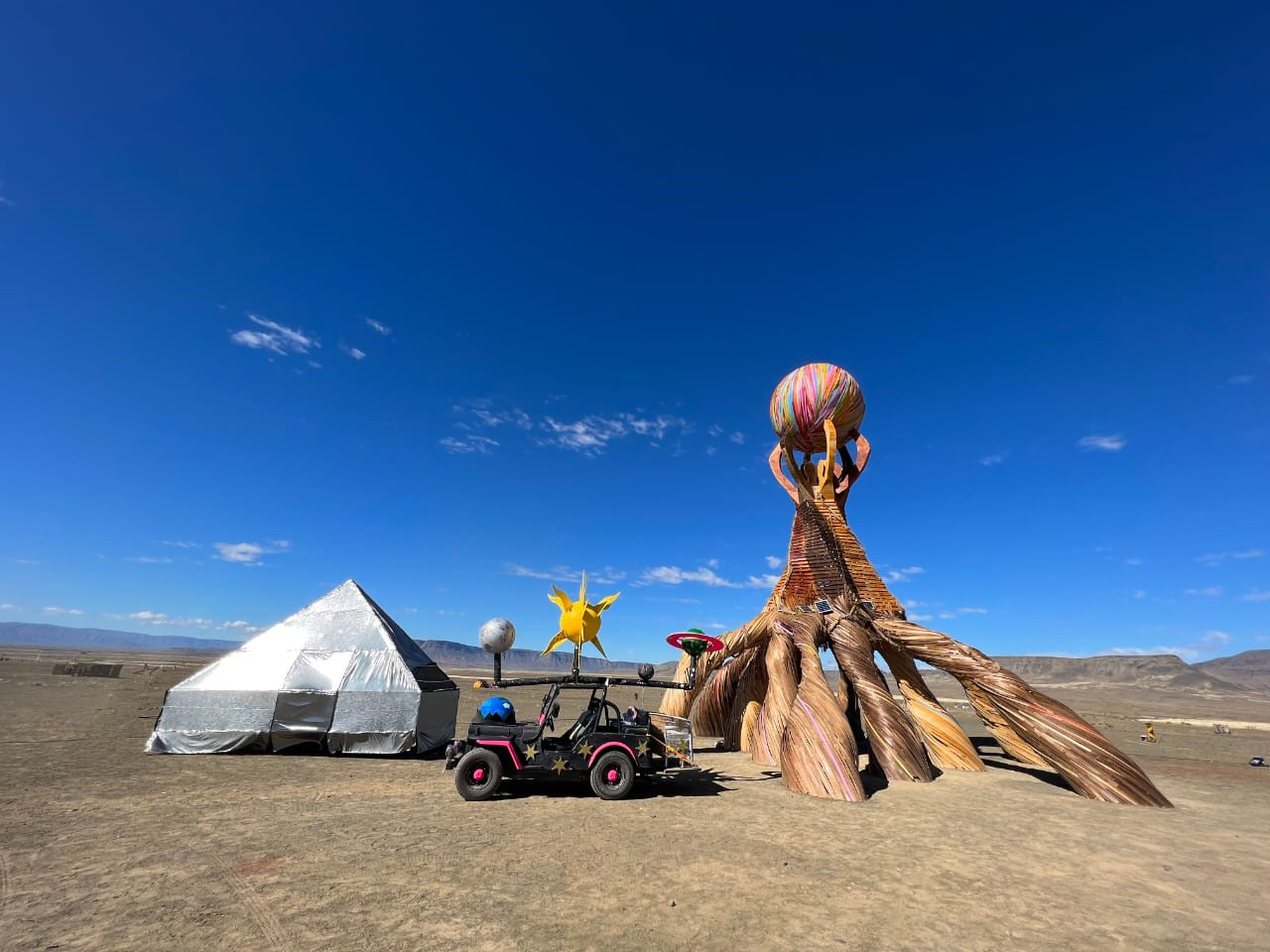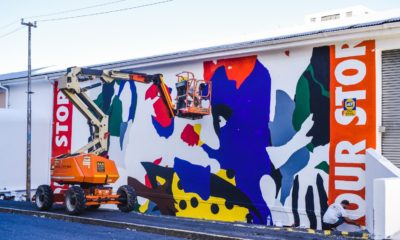
Lifestyle/Community

Kneidel and coffee – the Jews who ignite AfrikaBurn
“Part of the motivation of going to AfrikaBurn is to show my kids that you can keep Shabbat wherever you are,” says Karen Kallmann. “In a way, it’s like Shabbat – the amount of preparation you put in before will determine what you have on the day. Like Shabbat, you need to be present, live for the day, and be your best self.”
Kallmann is one of a number of observant and secular Jews who attend the festival, finding spirituality and freedom in the desert.
AfrikaBurn is a community who come together in the Tankwa Karoo every year for a festival of art, performance, theme camps, music, and togetherness. No money is exchanged, and everything is “gifted” by participants.
“The essential message of AfrikaBurn is gifting – finding the joy of giving rather than taking – which is really unusual today,” says Nicola Brivik, who has attended the festival four times. “It gives us a chance to remember that joy, and fulfils that childlike wonder of finding just what you need. The whole festival taps into that freedom of being a child – playing, dressing up, and having pure freedom.”
Jarryd Lake, an observant Jew, has brought Kabbalat Shabbat, Shabbat dinners, and even a Pesach seder to the festival. “In 2016, we hosted Camp Exodus, where we held a Pesach seder. It was the best Pesach I’ve ever had. In 2017, the Kneidel Maidels brought more than 100 people together for Shabbos. There’s a Jewish gene of wanting to be connected to community and each other and to be part of something bigger. That’s what draws many members of the Jewish community to AfrikaBurn and our Pesach and Shabbat events.”
Kallmann has been to AfrikaBurn “five times as a family – we have five children – and my husband went by himself this year. I love being disconnected from the ‘default world’. There’s no cellphone reception or WiFi. I love the community that’s created. You don’t feel that you have to live up to anybody’s expectations. ‘Radical self-expression’ is one of the principles. I also love the art – magnificent, enormous sculptures – and the desert and its extreme beauty and temperatures.”
However, she emphasises that “it requires a huge amount of preparation. Another of the principles is ‘radical self-reliance’, which means providing all your own shelter, water, and food as well as energy for cooking, lighting etc. I remember our lounge being packed with all sorts of goods including rebar to keep our tents pinned to the ground, and us needing to hire a one-ton trailer to get all our goodies (including bicycles) to the Tankwa Karoo. Gifting is another principle which requires a lot of prep – what are you going to gift and how are you going to get it to The Burn?” [as participants call AfrikaBurn].
Brivik is part of a group of about 50 who host a themed camp called Sunrisers. “We gift coffee every morning, which requires massive amounts of planning. We need generators and a huge amount of water.” They also bring everything one can imagine to go with the coffee, from oat milk to cinnamon to rusks. They even bake croissants and toasted sandwiches on site, and have a DJ playing music. Everything is donated by camp participants, who also work shifts to serve coffee. At one point, they were serving 900 cups of coffee a morning.
“Once you have been to AfrikaBurn you’ll always want to go,” says Brivik. “It’s creativity and collaboration at its very best. It’s curated by the people who go. It’s what you put in and take out.”
Her team also created a “mutant vehicle”, which drove around as movable art, changing the landscape and bringing childlike joy.
“It’s a temporary community of people who want a different way of living and sense of community in a relatively inhospitable environment,” says Lake, who has attended the festival since its inception in 2015. “It allows human beings to connect in a deep and meaningful way. It takes you out of your comfort zone, and forces you to grow from that. You don’t always get what you want, but you get what you need.”
Last year, he didn’t plan any Jewish events, but then heard that people were asking about it. “It shows that people want to connect with their Judaism. I ended up putting it together last minute, and asked people to bring what they could. It was an impromptu, crowd-sourced Shabbat.” He feels he’s able to be an observant Jew in the environment because it’s so respectful.
Kallmann worked with Lake in creating the Shabbat and Pesach events. “We gifted a Shabbat meal, which was very meaningful, especially for young Israelis who had been travelling through Africa and hadn’t had a Shabbat experience until they got to The Burn. It took a huge amount of effort, but was incredibly rewarding. We hosted two seders, which were really spectacular, and served kneidlach on most evenings of Pesach. We were also the place people could come to say kiddush during and over Shabbat.”
“The artwork is phenomenal,” says Brivik. “For example, this year there was a massive red heart gifted to a couple who got married at The Burn. Every year, a Clan Man is burned. I loved all the mutant vehicles – from puppets to an elephant blowing fire out of its trunk. Ours was decorated to tie in with this year’s theme of space.”
During the festival, artworks are burned to show the impermanence of life and the need to leave no trace. “The first time I saw the art burn, I felt heartbroken,” says Brivik. “But then I realised the beauty in the ephemeral nature of our world. Sometimes the art becomes even more beautiful when it burns.”
In this extremely free environment, anything goes, but Kallmann believes it’s a positive environment for children. “I really believe you find what you’re looking for. We were looking for fun things for our kids to do, and that’s what we found. People aren’t openly and obviously drunk, and the kids weren’t up until the wee hours of the morning.
“Our experience is that participants are all incredibly kind to children,” she says. “AfrikaBurn provided an incredible opportunity to spend quality time with my kids without any distractions. However, if you’re sensitive to nudity, you shouldn’t go. My kids were appropriately amused and/or disgusted by the nudity, but I don’t believe it harmed them.”
“I see people’s eyes light up when they’re able to find community and connect with their Judaism in the desert,” says Lake. “They’re connecting with G-d, themselves, and each other in a pure way. I’m proud to be part of that.”






